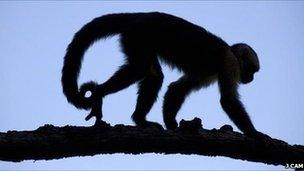Capuchin monkeys 'shun selfish humans', study suggests
- Published

The capuchin monkeys responded best to helpful humans and shunned those who were selfish
A monkey species has been found to avoid people who are "selfish", according to researchers.
Scientists from Stirling University and Kyoto University in Japan observed capuchin monkeys responded best to humans who were helpful to others.
They placed the animals in front of actors and asked the humans to act in helpful or unhelpful ways.
The teams said the capuchin were more likely to take food from helpful people than "selfish" ones.
The monkeys were allowed to observe how the actors interacted with each other.
Evaluated responses
Dr Jim Anderson from the University of Stirling, who led the research team, said: "We found the monkeys accepted food less frequently from the human performers who persistently rejected the other person's requests for help.
"This research is significant as it provides evidence that social evaluation based on third-party interactions, the way we respond to others, is not unique to humans."
Human beings start evaluating others through eavesdropping or the perceived reputation of others at an early age.
However, there had been little experimental analysis of the "social evaluations" of other species.
Monkey judgement
Dr Anderson said: "The situations acted out in front of the monkeys were of no direct relevance to the animals. However, they judged the interactions of the humans and their disposition.
"This research complements another paper, recently published in the journal 'Cognition', showing that capuchin monkeys also negatively evaluated humans who refused to fully reciprocate in an exchange of objects with another person.
"In other words, the monkeys tended to avoid people who behaved selfishly in interactions with others."
Capuchin monkeys were discovered by explorers to the Americas in the 15th Century.
They are highly intelligent and have been used by old-fashioned organ grinders and kept as pets.
More recently some of them have been trained as aides for paraplegic humans.
- Published13 February 2013
- Published13 July 2012
- Published21 April 2011